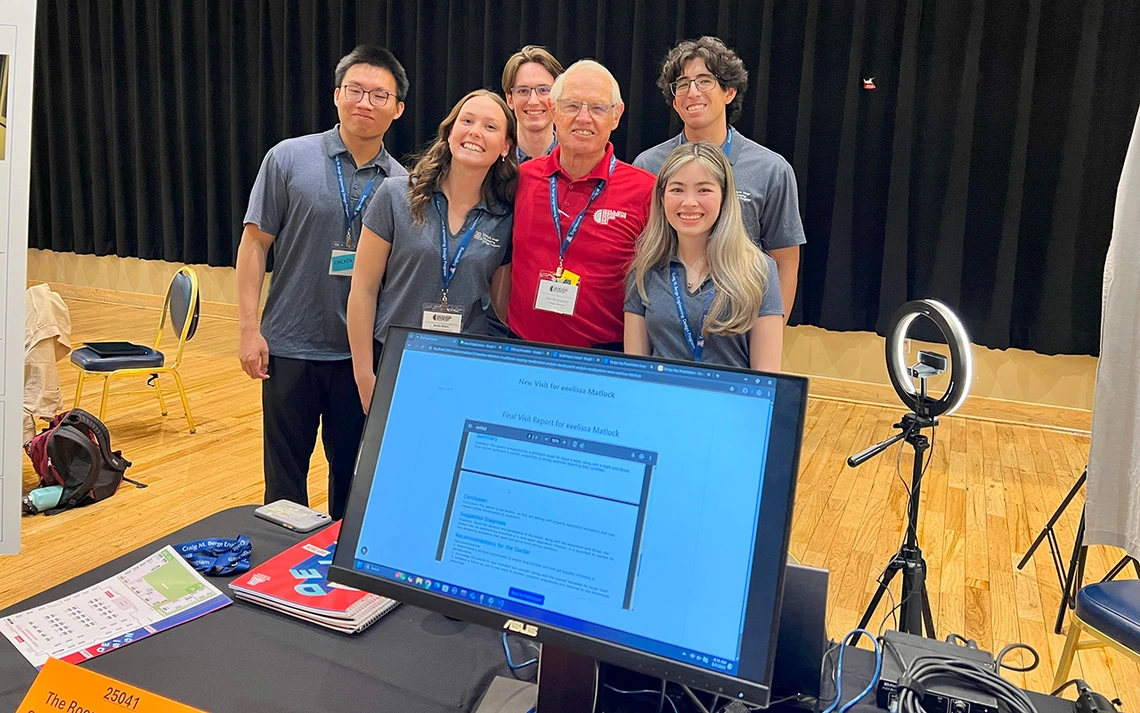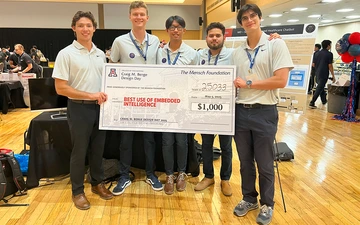Teams work to integrate artificial intelligence in health care

Members of Team 25041 pose with capstone mentor Don McDonald at the 2025 Craig M. Berge Design Day.
Two AI-powered capstone projects presented at the 2025 Craig M. Berge Design Day could improve health care and deliver medical knowledge to doctors in rural areas.
Upgrading point-of-care
Interdisciplinary Capstone Team 25041 presented its project, The Room Knows – a suite of AI tools designed to improve medical exams.
“Artificial intelligence will be really important technology in the future for the fields of medicine and optometry,” said Bella Klein, team lead and 2025 biomedical engineering graduate.
Klein, who plans to become an eye doctor, said she was eager to join the project.
The rise of telehealth during the COVID-19 pandemic inspired Klein to explore how AI could adapt to evolving health care practices. The Centers for Disease Control and Prevention found telemedicine use among physicians was 15.4% in 2019 and increased to 86.5% in 2021.
The team’s tools were controlled by three AI models that analyzed physical and verbal cues presented by a patient during an exam. Using a camera, an imaging model interpreted facial expressions to determine emotional state, which the team trained with 46,000 images labeled for distinct emotions ranging from serious pain to happy. The system can also compare a patient’s emotional status to prior visits.
A speech model assessed verbal cues by comparing speech captured on audio to scripts provided by the team.
“It detects the alterations of the words, the accuracy and what they’re describing,” Klein said.
The tool not only performs a sentiment analysis but also transcribes the patient’s speech for the clinician.
Next, they analyzed motion with the help of Google Media Pipe, an AI tool that tracks people as they walk. It detects abnormalities in gait and compares a patient’s walk to data from previous doctor's visits.
And like a medical chart, the observations are pulled into one final summary for the doctor.
Team mentor Don McDonald praised the team’s work, noting this was the project’s second year and its most advanced iteration yet: “This is the closest I’ve seen this project be ready for use.”
Team 25041’s tools tested well, achieving 75% accuracy in describing a patient’s emotional and physical state.
Increasing health care accessibility
Another team employed AI to improve medical care in developing countries.
Team 25033 was tasked to create MD-Sensei. The AI-powered smartphone application delivers science-backed clinical guidance to users.
“This is something that will be used in remote areas, and the sponsor wants a medical doctor that may not have available training to have access to an AI that could help them and fill gaps,” said team member Cameron Brown, a 2025 software and systems engineering graduate.
MD-Sensei can be downloaded on a low-cost smartphone and doesn’t require an internet connection, opening the possibility of use anywhere in the world.
AI in action
When a user asks MD-Sensei's chatbot a medical question, the system sorts and analyzes medical documents to deliver clinical guidance. The students used these documents to train the chatbot’s model.
“The AI uses only safe, accurate medical knowledge,” said team member Oliver Seymour, a 2025 software engineering graduate.
For security, the team created an administrative website to manage the system and view the answers generated by the tool.

Team 25033 celebrates winning The Mensch Foundation Award for Best Use of Embedded Intelligence for its smartphone application, MD-Sensei, at the 2025 Craig M. Berge Design Day.
“We also made an extremely secure, scalable server on the cloud,” he added.
MD-Sensei's chatbot is scalable for worldwide use as well. The team designed the tool to generate medical guidance specific to country and language. And over time, the administrator can add more documents to the back end, increasing the model’s wealth of knowledge.
“Our sponsor wants to support 80 countries each with completely unique medical knowledge,” Seymour said. “Real people are going to be using this in the next year.”
Team 25033 won The Mensch Foundation Award for Best Use of Embedded Intelligence.

